This guide will equip you with vital strategies to maintain healthy and resilient skin during the harsh winter months. As temperatures drop, your skin faces increased risks of dullness, dryness, and irritation, making it vital to adapt your skincare routine. You can combat these effects by incorporating the right products and practices that will help your skin stay moisturized, protected, and radiant. Read on to discover actionable tips to shield your skin from winter’s toll.
[This post contains Amazon affiliate links. Thank You So Much if you purchase through these links. I may earn a small commission but you don’t pay any extra.]
Table of Contents

Key Takeaways: How to Keep Your Skin Resilient in Winter.
- Hydration: Keep your skin moisturized by using thicker creams and ointments that lock in moisture throughout the day.
- Gentle Cleansing: Opt for mild, non-drying cleansers that prevent stripping natural oils from the skin.
- Sun Protection: Even in winter, apply sunscreen to protect against harmful UV rays that can affect skin health.
- Humidifiers: Utilize humidifiers in your home to combat dry indoor air, which can contribute to skin dehydration.
- Balanced Diet: Fuel your skin with a diet rich in vitamins, omega-3 fatty acids, and antioxidants to enhance resilience.
Understanding Skin Resilience
Before exploring into how to enhance your skin, it’s vital to grasp the concept of resilience. Skin resilience refers to its ability to recover from environmental stressors while maintaining its structural integrity and function. Think of your skin as a protective barrier that faces various challenges, especially during the harsh winter months. Understanding how different skin types respond to cold weather can help you tailor your skincare routine to keep your skin healthy and vibrant.
Types of Skin and Winter Challenges
Resilience in skin varies from person to person, largely depending on your skin type. Here’s a breakdown of different skin types and their respective winter challenges:
| Skin Type | Winter Challenges |
|---|---|
| Dry Skin | Loss of moisture leading to flakiness |
| Oily Skin | Increased breakouts due to heavy skincare products |
| Combination Skin | Difficulty balancing hydration and oil production |
| Sensitive Skin | Reactions to cold wind and harsh products |
| Normal Skin | Inadequate moisture if not properly cared for |
Your skin type significantly influences its vulnerability during winter. Understanding these types can help you choose the right products. The key to maintaining skin resilience during winter lies in identifying your skin type and recognizing the specific challenges it faces.
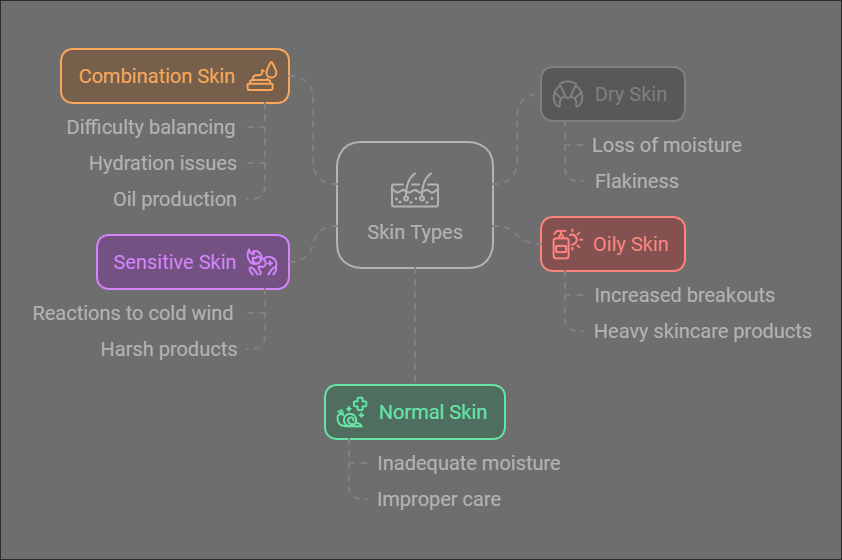
Factors Affecting Skin Resilience in Cold Weather
Little do many realize, several factors influence the resilience of your skin during the cold months. Factors such as indoor heating, low humidity, and exposure to harsh winds can strip your skin of its natural moisture, making it imperative to adapt your skincare routine accordingly. Furthermore, age and lifestyle choices play significant roles in how well your skin copes with such conditions.
- Indoor heating: Can lead to dehydration.
- Low humidity levels: Increase the risk of irritation.
- Harsh winds: Can cause skin damage.
- Dietary choices: May affect skin health.
- Age-related factors: Lead to reduced oil production.
This combination of factors necessitates that you not only enhance your skincare regimen but also adopt lifestyle changes that will bolster your skin’s defenses against winter’s harsh effects.
A deeper understanding of these challenges allows you to create a more effective skincare routine. Incorporate hydrating products, consider your diet, and be mindful of your environment to support your skin’s resilience.

Essential Tips for Winter Skin Care
One of the best ways to maintain your skin’s resilience during the winter months is to adopt effective skin care habits. As temperatures drop, your skin can become dehydrated and irritated, making it crucial to be proactive in your approach. Here are some crucial tips to keep in mind:
- Use a gentler, moisturizing cleanser to avoid stripping your skin.
- Apply a thicker moisturizer immediately after showering to lock in hydration.
- Incorporate a humifier in your home to maintain humidity levels.
- Limit hot showers, as they can exacerbate dryness.
- Protect your skin from the elements with gloves and scarves.
Assume that following these guidelines will help your skin thrive against the harsh winter climate, enabling you to maintain a healthy and vibrant complexion.

Daily Routine Adjustments
Little changes in your daily routine can significantly impact the health of your skin. Start by reassessing your cleansing and moisturizing habits; consider switching to products specifically formulated for dry skin. You should also include a gentle exfoliant in your skincare regimen, but only once a week to remove dead skin cells without causing irritation. Additionally, pay attention to how often you apply moisturizer throughout the day, especially if you spend a lot of time in heated indoor environments.
Furthermore, integrating a nourishing facial oil or serum into your evening routine can work wonders for restoring moisture levels while you sleep. This simple addition can create an added barrier against the cold, leaving you with rejuvenated skin come morning. Don’t forget to carry a travel-friendly moisturizer with you to combat unexpected dryness and maintain glowing skin all day long. .
Hydration and Nutrition for Skin Health
The importance of hydration and nutrition cannot be overstated when it comes to skin health during winter. Make sure you are drinking sufficient water daily to keep your skin hydrated from within. Additionally, loading up on foods rich in omega-3 fatty acids, such as fatty fish, walnuts, and flaxseeds, can provide the necessary nourishment for your skin. Antioxidant-rich fruits and vegetables will also enhance your skin’s resilience, supporting its natural barrier against the elements.
- Anti aging serum
- Smoothes out fine lines and wrinkles
- Line: vital c

- Paraben free
- Facial Moisturizer
- Moisturize and rejuvenate

- TULA & PROBIOTIC EXTRACTS: We combine powerful probiotic extracts and skin superfoods for healthy, balanced and glowing …
- YOUR FAVORITE DO-IT-ALL MOISTURIZER: This whipped moisturizer delivers deep hydration to help revive dull, tired skin. F…
- PROBIOTICS & SUPERFOODS: This nourishing cream, full of naturally derived probiotics and superfoods, reveals an even, gl…

- RESIST AND RENEW: This lightweight moisturizer provides broad-spectrum sun protection to prevent premature aging of the …
- Paula’s Choice RESIST Youth-Extending Daily Hydrating Fluid SPF 50 Anti-Aging Face Moisturizer provides effective UVA & …
- Use Paula’s Choice RESIST Youth-Extending Daily Hydrating Fluid SPF 50 daily as part of your morning skin care routine a…

Health is not solely about topical treatments; it’s about a holistic approach that includes what you put into your body. Consuming a balanced diet with adequate vitamins and minerals can lead to a noticeable improvement in your skin’s elasticity and moisture retention. Ensure you include crucial nutrients, as deficiencies can result in dry, flaky skin during the winter months. Pay attention to your digestive health as well, as a happy gut can reflect positively on your skin’s appearance.
Step-by-Step Guide to a Winter Skin Care Regimen
Unlike summer, winter presents unique challenges for your skin that require a thoughtful approach to your skincare routine. A comprehensive winter skin care regimen will not only protect against the environmental stressors of the season but will also help maintain your skin’s natural resilience. Below is a structured guide to refining your winter skincare routine, ensuring your skin remains hydrated, healthy, and glowing throughout the cold months.
| Step | Description |
|---|---|
| Cleansing | Use a gentle, hydrating cleanser to remove impurities without stripping moisture. |
| Exfoliation | Exfoliate once a week to remove dead skin cells, promoting cell renewal and hydration. |
| Moisturizing | Apply a rich moisturizer to lock in hydration and create a barrier against dryness. |
| Sunscreen | Even in winter, apply sunscreen daily to protect against UV damage. |
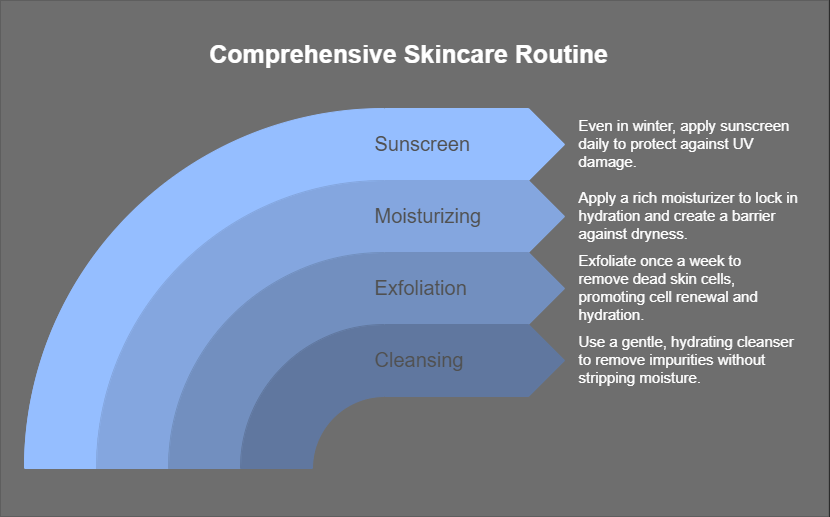
Cleansing and Exfoliation
Care for your skin starts with cleansing. To combat winter dryness, opt for a gentle, hydrating cleanser that effectively removes dirt and makeup without stripping away important oils. Follow this with a weekly exfoliation, as exfoliating helps to slough off dead skin cells that can accumulate and contribute to a dull complexion. Choose a mild exfoliant to avoid irritating your skin, especially in colder weather.
Moisturizing Techniques
Regimen consistency is key when it comes to winter skin hydration. Select a rich moisturizer that suits your skin type, focusing on those containing ingredients like hyaluronic acid, glycerin, or ceramides to help retain moisture. Don’t forget to layer your products properly; apply creams or lotions over damp skin to seal in hydration effectively. Additionally, consider using an overnight mask or a thicker cream in the evenings to boost moisture levels.
For instance, opting to use a thicker moisturizer at night allows your skin to absorb the nutrients while you sleep, resulting in a well-hydrated complexion by morning. Incorporating a moisturizing serum before your cream can also enhance the effectiveness of your routine, creating a hydration barrier that remains intact throughout the night.
Protective Measures Against the Elements
Guide yourself through the winter months by implementing protective measures that shield your skin from harsh weather conditions. This should include wearing gloves when outdoors to prevent dry, cracked hands and using a lip balm to protect your lips from becoming chapped. Ensure you’re staying hydrated by drinking plenty of water, as internal hydration is as important as external hydration when facing the winter’s bitter winds.
The commitment to a comprehensive protective strategy can make a significant difference in how your skin feels and looks all winter long. By utilizing products that fortify your skin’s natural barrier, you can reduce the risk of irritation and maintain optimal moisture levels.
Pros and Cons of Different Winter Skin Care Products
Keep in mind that choosing the right skin care products for winter can significantly impact your skin’s resilience. The market offers a variety of options, each with its advantages and disadvantages. Understanding these can help you make informed decisions tailored to your specific needs. Below, you’ll find a comparison of several common winter skin care products laid out in a concise table format.

Pros and Cons of Winter Skin Care Products
| Product Type | Pros and Cons |
|---|---|
| Moisturizing Creams | Pros: Heavy-duty hydration; great for dry skin. Cons: Can feel greasy for some skin types. |
| Body Lotions | Pros: Lightweight and easy to apply. Cons: May not provide sufficient moisture for severely dry skin. |
| Ointments | Pros: Excellent for intense hydration; ideal for cracked skin. Cons: Can clog pores and feel too thick. |
| Serums | Pros: Concentrated ingredients; absorbs quickly into skin. Cons: Can be pricey and not always hydrating enough alone. |
| Natural Oils | Pros: Nourishing and can be easily absorbed. Cons: May irritate sensitive skin types. |
| Exfoliators | Pros: Helps remove dead skin; promotes cell renewal. Cons: Over-exfoliation can lead to increased dryness. |
| Sun Protection Products | Pros: Essential for preventing skin damage even in winter. Cons: Some formulas can cause breakouts. |
| Hydrating Masks | Pros: Deep hydration; great for a winter pick-me-up. Cons: Can be time-consuming to apply. |
| Commercial Brands | Pros: Often dermatologically tested; clinically proven. Cons: Inconsistent ingredient quality; can contain irritants. |
| Homemade Remedies | Pros: Natural ingredients; customizable for your skin type. Cons: May lack stabilization and preservation. |
For more detailed information about the best practices and products for your winter skin care routine, check out these helpful Winter Skin Care Tips: Protect & Rejuvenate.
Creams vs. Lotions
Even though creams and lotions both serve the purpose of moisturizing your skin, they differ in formulations and effectiveness. Creams are typically thicker and more emollient, making them suitable for dry, flaky skin that requires deep hydration during harsh winter months. Conversely, lotions are more lightweight and absorb quickly, making them easier to apply and less greasy. If you find yourself dealing with persistent dryness, investing in a good-quality cream might be worth your while, while lotions can be perfect for daily maintenance.
If you are contemplating between natural remedies and commercial skin care products, there are several factors to consider. Natural remedies often use ingredients like coconut oil, shea butter, or honey, which can be gentle and nourishing. However, they may lack consistency in formulation and effectiveness. On the other hand, commercial products tend to have reliable, standardized ingredients that are often formulated to target specific skin concerns, but they can also contain potential irritants or allergens.
Remedies such as coconut oil and aloe vera gel can be great for moisturizing and soothing dry skin without the harsh chemicals found in some commercial options. However, be cautious about using natural products, as they may not provide the long-lasting effects that commercial products offer. Always perform a patch test to ensure that your skin won’t react negatively. Understanding the benefits and drawbacks of each type of product can assist you in crafting an effective winter skincare routine that keeps your skin looking healthy and resilient throughout the colder months.
Lifestyle Adjustments for Better Skin Health
To ensure your skin maintains its resilience during the harsh winter months, it’s crucial to make a few lifestyle adjustments. One of the most effective ways to care for your skin is by controlling the indoor climate of your home. During winter, indoor heating systems can significantly lower humidity levels, leaving your skin feeling dry and irritated. You can combat this by utilizing a humidifier, which adds moisture to the air, helping to keep your skin hydrated. Additionally, consider positioning your living spaces away from direct heat sources, and keep your showers lukewarm instead of hot to minimize moisture loss.
- Breathe Better, Live Better – Maintain ideal humidity levels in your home (40-60%) with Vicks warm mist humidifier and k…
- Portable, Easy to Use and Clean – With a top fill, 1 gallon tank providing 24 hours of use in a small or large room up t…
- Quiet Operation for Restful Nights – Ideal air humidifiers for bedroom use, the whisper-quiet operation ensures undistur…

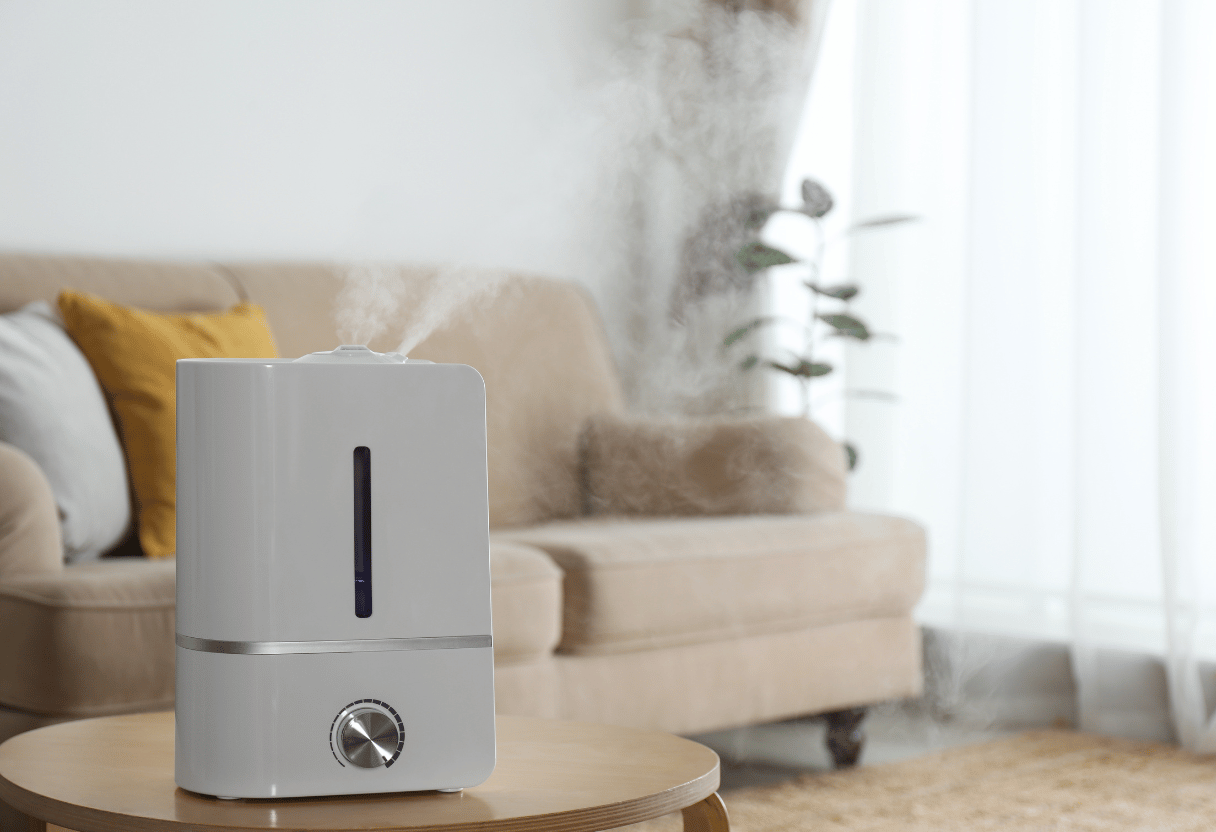
Indoor Climate Control
Health plays a vital role in your skin’s ability to adapt to winter conditions. Using a humidifier can replenish moisture in the air, preventing your skin from drying out. Incorporating indoor plants can also help naturally humidify the air while fostering a pleasant atmosphere. Regularly moisturizing your skin with rich creams or oils after bathing can trap hydration and create a protective barrier against the dry ambiance. These small adjustments can combat winter’s negative effects and promote healthier skin.
Clothing Choices and Protection
Choices you make regarding your winter wardrobe greatly influence the health of your skin. Opting for breathable fabrics that wick moisture away from your body can prevent sweat build-up, which might lead to irritation. Moreover, layering your clothing allows you to adjust your temperature throughout the day, avoiding overheating that can cause your skin to become irritated.
Additionally, wearing gloves and scarves can shield your skin from harsh winter winds and freezing temperatures, which often lead to chapped and sensitive skin. Applying a thick barrier cream on exposed areas provides an extra layer of defense against the cold. By making informed clothing choices, you can maintain your skin’s resilience, ensuring it looks and feels its best even in the winter chill.
Common Skin Issues in Winter and How to Combat Them
All of us look forward to the beauty of winter; however, it can bring various skin challenges. Your skin may become more prone to issues, particularly due to the cold, dry air that can lead to irritation and discomfort. Understanding how to combat these common skin problems is vital. For further insights on maintaining healthy skin during this season, check out the Science Of Winter Skin Care: Protect Your Skin From The ….
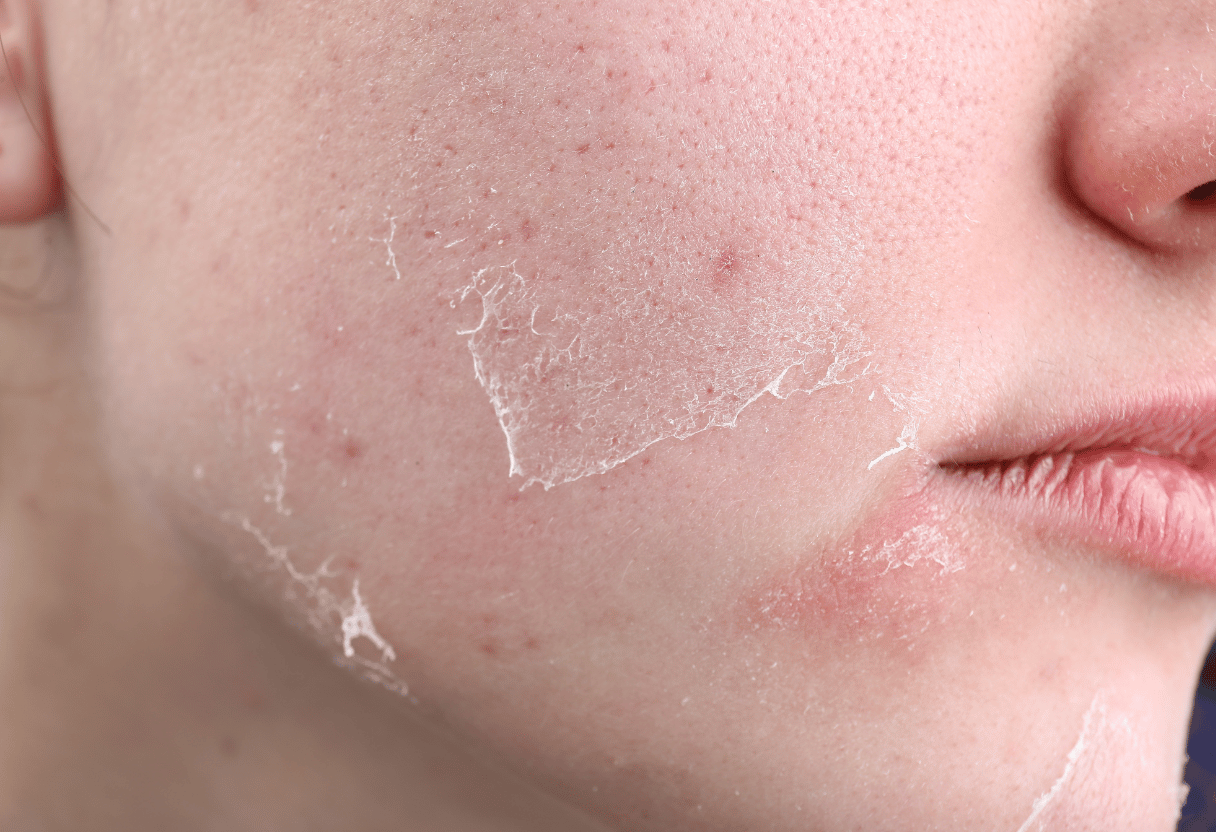
Dryness and Flakiness
Winter often causes your skin to become extremely dry and flaky. The cold air outside, paired with the heated indoor environments, strips your skin of its natural moisture. To combat this, you should focus on employing a heavy moisturizer to keep your skin hydrated. Look for products that contain ingredients like hyaluronic acid, glycerin, and ceramides to lock in moisture and restore your skin’s barrier function. Regularly exfoliating can also help slough off dead skin cells, revealing a smoother texture underneath.
Acne and Breakouts
There’s a common misconception that cold weather means fewer breakout issues, but in reality, winter can exacerbate acne for many. The abrupt changes in temperature and humidity can lead to an overproduction of oil, leaving your skin feeling greasy and increasing the likelihood of clogged pores. On top of that, stress levels may rise during the holiday season, which can further stimulate acne production. Incorporating non-comedogenic products into your routine is vital for maintaining clear skin and preventing breakouts.
Issues related to breakouts during the winter can also be influenced by your skincare routine. If you find that your usual products are becoming less effective, consider adapting them for the winter months. Look for treatments that include salicylic acid or benzoyl peroxide, and ensure you are still moisturizing, as some acne treatments can lead to dryness and irritation. Balancing oil control with hydration is key to keeping your skin healthy during these colder months.
To Wrap Up
Presently, maintaining your skin’s resilience during the winter months requires a mindful approach to your skincare routine. You should prioritize hydration both internally and externally. Incorporate a rich moisturizer into your daily regimen, ensuring it contains ingredients like hyaluronic acid and ceramides, which support the skin barrier. Additionally, don’t underestimate the power of physical barriers such as gloves and scarves to protect your skin from harsh winds and cold temperatures. Regularly exfoliating your skin can also help to remove dead skin cells, allowing for better absorption of the products you use.
It’s also wise to adapt your diet to support your skin’s needs in winter. Focus on consuming foods rich in omega-3 fatty acids and antioxidants, which can aid in keeping your skin nourished from the inside out. Staying hydrated by drinking plenty of water is just as important, even if you don’t feel as thirsty during the colder months. By taking these steps, you will not only enhance your skin’s appearance but also its functionality, ensuring it remains strong and vibrant no matter the weather outside.
FAQ:
Q: Why does winter affect my skin’s resilience?
A: Winter can significantly affect your skin due to lower humidity levels and cold air, which strip moisture from the skin’s surface. The combination of indoor heating also leads to dry air, causing the skin to lose its natural oils, making it feel dry, tight, and sometimes irritated. It’s important to adjust your skincare routine to combat these seasonal changes.
Q: What are the best skincare products to use in winter?
A: During winter, opt for thicker creams and balms that provide intense hydration. Look for products containing ingredients like hyaluronic acid, glycerin, and ceramides, which help retain moisture. Additionally, consider using a gentle cleanser that won’t strip away natural oils, as well as a rich moisturizer that can form a barrier to protect your skin from harsh weather conditions.
Q: How often should I moisturize my skin during winter?
A: It’s advisable to moisturize your skin at least twice a day in winter; once after showering or washing your face, and again before bed. If your skin feels particularly dry, consider applying moisturizer more frequently throughout the day. You can also layer products by using a lighter serum underneath a thicker cream for extra hydration.
Q: Are there any dietary changes that can support skin resilience in winter?
A: Yes, incorporating foods rich in omega-3 fatty acids, such as fish, walnuts, and flaxseeds, can enhance skin health. Additionally, drinking plenty of water and consuming fruits and vegetables high in vitamins A and C can boost your skin’s ability to retain moisture and promote overall resilience. Herbal teas and broths can also help in keeping your body hydrated during the colder months.
Q: What lifestyle habits can help maintain skin resilience in winter?
A: Maintaining a consistent skincare routine is imperative. Additionally, avoid taking long, hot showers, as they can further dry out the skin. Using a humidifier in your home can add moisture to the air, benefiting both skin and respiratory health. Regular exercise can improve blood circulation, which helps keep your skin healthy and glowing, even in winter.













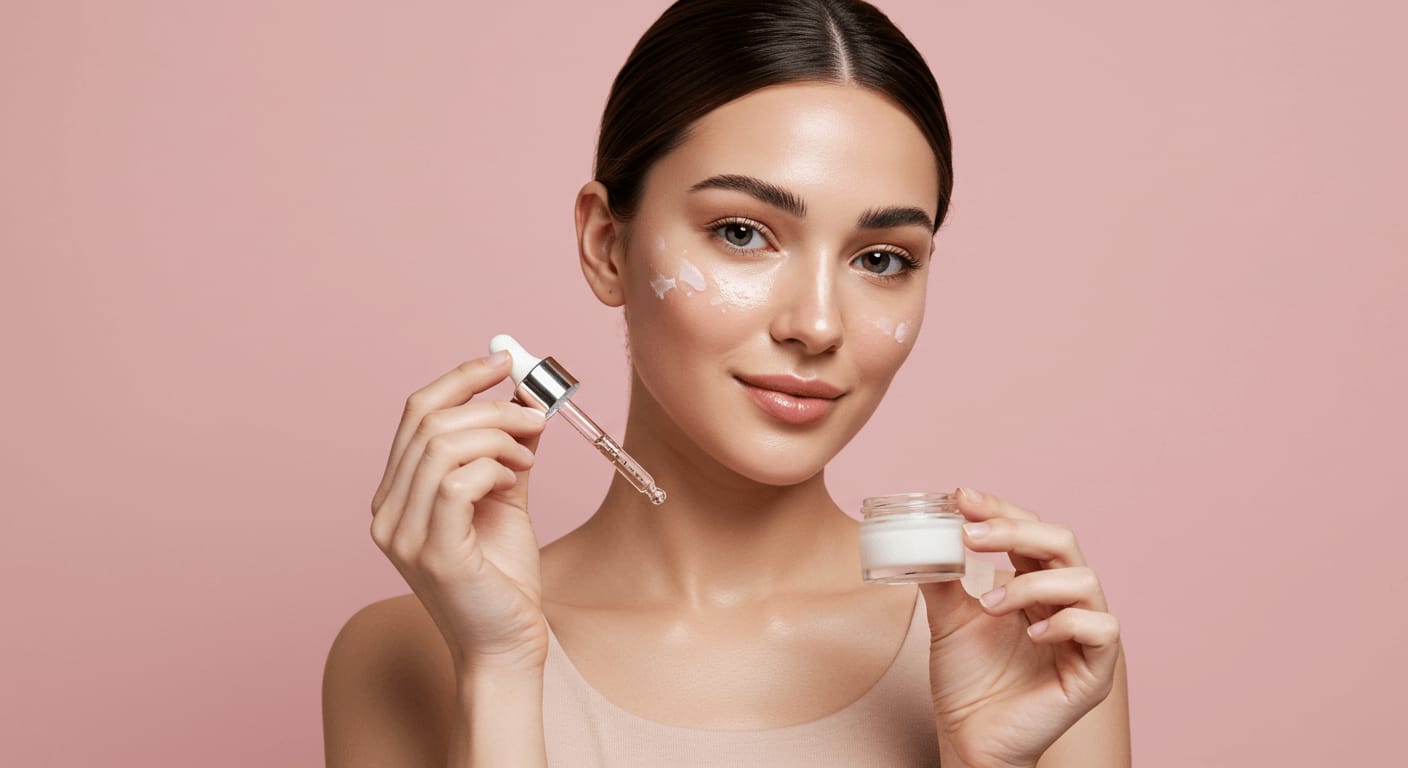









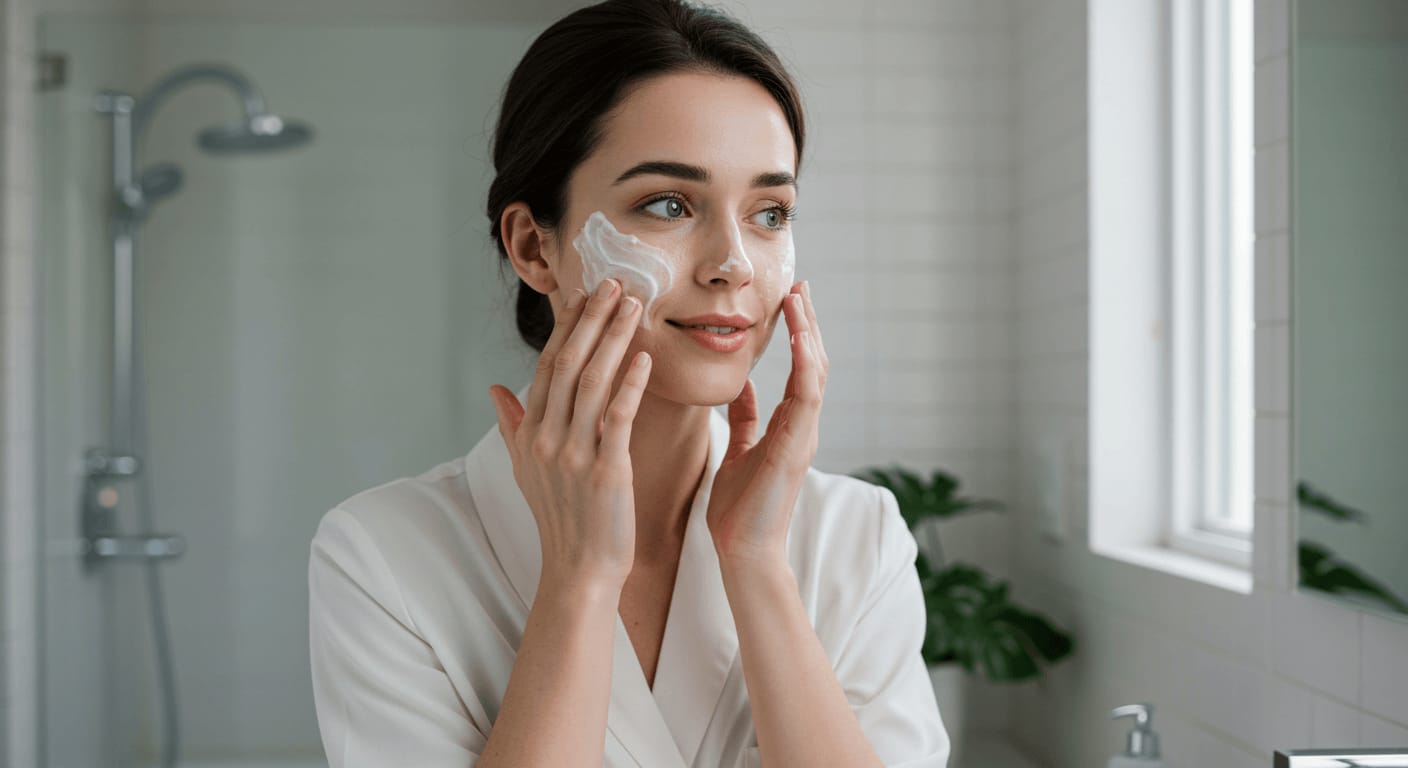








0 Comments